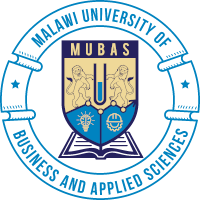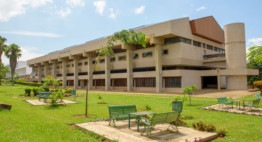Master of Arts in Health and Behavioural Change Communication (MHBCC)
The MHBCC will contribute to the government of Malawi needs and efforts to employ and increase qualified human capacity in the health sector particularly those that can help in the effective dissemination of health messages and health promotions for behaviour change. The programme is aimed at practicing EHPs, graduates and other relevant professionals who wish to develop a career in health and behaviour change communication. The MHBCC curriculum responds to international and national initiatives such as the Millennium Development Goals (MDGs), Malawi Growth and Development (MGD) strategies, andnational health policies and strategies. Furthermore, the content is responding to many behaviour change problems raised in numerous studies as reported in the MalawiDemographic Health Surveys. Progress towards the key MDGs can be accelerated through improved health and behaviour change, in particular the MDGs for child health, access towater and sanitation and environmental sustainability. While many other interventions may also accelerate progress, the multi-sectoral approach to environmental health education offers cost effective and sustainable improvements. The Polytechnic strategic plan, which is embedded in the University of Malawi strategic plan, aims "to advance knowledge and professional competencies in science, technology, commerce and communication#.
The absence of information on behaviour change remains a big challenge and contributes to lack of health related behaviour change as evidenced by the increase of infection particularlyHIV and AIDS, malaria and diarrhoea. There is great need for expertise effort to design and implement effective behaviour change strategies and interventions that will stimulate and empower people to take informed decisions to change the risky attitudes, perceptions, practices and behaviour and help create a healthy Malawi. Therefore the proposed MHBCC will produce the desired competences for sustainable behaviour change.
As can be seen in the Annex i media advertisements from international NGOs and government show that there is great need for highly and properly qualified Behaviour Change Communication (BCC) specialists to lead in the successful management of BCCinterventions and programmes. The MHBCC will be able to produce such specialists.
That most communication specialists who work in the health sector lack the health background, the MHBCC is designed to produce balanced and thoroughly integrated specialists in health and change apart from communication. This is achieved by introducing health and disease epidemiology related modules in the MHBCC. IEC officers are amongst Environmental Health Practitioners (EHPs) working in the Ministry of Health. Presently outof 450 EHPs, only 11 EHPs have been trained at postgraduate level. Therefore, given thediverse and dynamic nature of global, regional and local health problems, the introduction ofthis postgraduate programme will enhance knowledge base and skills in health and behaviour change communication.
MODULES
1 APS-EBS-611: Disease Epidemiology and Biostatistics
This module is designed to instill in health communicators knowledge of various diseases and related epidemiological methods and biostatistics that can contribute to the effective investigation and control of communicable and non-communicable diseases in Malawi and the region.
2.8.2 EMS-CMA - 611: Communications Management
This module is planned to equip and refine students!knowledge and skills for effective business, organizational and managerial communication. It gives guide and practice for effectivecommunication on personal, supervisory and managerial levels. It specifically offers effective, human, interpersonal, oral, written, non-verbal, visual, corporate, organizational and managerial communication and language for effective communication. The module also prepares students on how to manage a communication or media organizations, department, programmes committed on the causes of change and development
2.8.3 EMS-SBC - 611: Social and Behaviour Change Communication Theories
The module provides knowledge base of all the theories, models, approaches and processes for effective behaviour change and helps students make informed decision in designing andevaluating the BCC researches, strategies and interventions
2.8.4 EMS-MMI - 611: Mass Media and Behaviour Change Communication Materials
This is a media and materials production module which is designed to equip students with three skills namely, (a) selection of effective mass media and materials, (b) designing and production of strategic education, communication and information (IEC) and mass media materials for effective behaviour change. The materials include visual channels such as posters,leaflets and bill boards; audio visuals (CD, and tapes), mass media such as print (new letter, news paper, brochures, manuals, guide and handbooks); broadcast (radio and television) and other electronic mass media products (social media, web designing). As a practical module, it isdesigned to give students chance to undertake a major project on media and materials for behaviour change.
2.8.5 EMS-MCM - 611: Interpersonal Media & Community Mobilization for Behaviour Change
This module develops students! skills in using interpersonal face to face and community media/channels that are instrumental for behaviour change. It focuses on one to one channels such ascounseling, peer to peer; Interactive group communication such as focus group discussions, door to door, participatory advocacy; Public media and communication like health talks, testimonies and speeches; Training, education and facilitations such as workshops, dissemination seminars,symposia, forums, lectures and lessons; Participatory edutainment for change like theatre, music, dance. The module pivots on how the interpersonal media can collectively employed to form community mobilization for behaviour change and development.
2.8.6 EMS-MEV - 611: Monitoring and Evaluations
This module offers knowledge and skills that are needed to carry out monitoring and evaluation assignments on activities, projects and programmes related to health and behaviour change communication.
2.8.7 APS-ESD-612: Environmental Health and Sustainable Development
This module is aimed developing understanding of key principles of Environmental Health and related sustainable development. It offers chance to analyze factors in the environment whichaffect human health and how to control them. These include but not limited to sanitation,hygiene, safety, pollution, housing, population growth, climate change, resources depletion,economic conception, environmental assessment and management
2.8.8 EMS-SHC - 612: Strategic Health Communications and Promotions
The module orients students to the nature and elements of Health Communication and Promotions. The module specifically refines students! ability to design and implement effectivehealth communications and promotions for behaviour change. It provides them with knowledge and skills for Integrated Health Marketing Communications comprising Public Relations,Advertising, Promotion and Social Marketing. It offers skills for sustainable community changeskills embracing Participatory Heath Education, Health Advocacy and Health Mobilization.
2.8.9 EMS-KHM - 612: Knowledge and Health Management Information Systems
This is a combination of Knowledge Management (KM) and Health Information Management System (HIMS). It is aimed at imparting KM embracing planning, acquisition of data,organizing, storing, retrieving, utilization and dissemination of Health information systems particularly using the Information technology and systems. The module will also help healthcommunicators to create and utilize links, electronic media and channels to communicate health issues. The module breaks the barrier between IT or IMS professionals and communicationprofessionals so that they work together to communicate health and behaviour change
2.8.10 EMS-PRM - 612: Project Management
The module offer student!s knowledge and skills that are needed to manage people,organizations, projects and programmes effectively. The module combines Project Management and Management Principles and responds to the need for skilled health sector human resourcewho can effectively manage projects and programmes particularly related to HBCC. Specifically,the course offers principles and skills in Management Principles and Leadership; Strategic and Change management; Scope, Time and Context Management; Project Planning and Project CycleManagement; Project Human Resources Management; Procurement, Cost and Finance Management; Quality Management
2.8.11 EMS-CER - 612: Communications Ethics, Law and Health Rights (Elective)
This module introduces health communicators to the communications ethics, code of conduct, law and health rights to make them more professional and equally empower them withknowledge base for promoting the rights of health workers, patients or clients.
2.4.12 EMS-RSM - 612: Research Methodology
This module shapes students skills for conducting various researches in health and communication areas. Specifically, it will refine student!s knowledge on research designing,proposal writing, data collection, analysis and presentation using appropriate tools.
2.4.13 EMS-TES -621/2: Thesis
The aim of the module is to develop students! skills in designing and conducting relevantacademic and project based research related to health and behaviour change communication
ADMISSION CRITERIA
Applicants must have a bachelor’s degree in any of the following: environmental health, communication, health promotion, health education, journalism, media studies, humanities or any other related field with at least a strong pass (55% to 59%) and two years of work experience at graduate level in a relevant health field.
Tuition Fees: Successful applicants will be required to pay a tuition fee of Malawi Kwacha equivalent of US$5,500.00 for local and SADC students and US$7,000.00 for other international students for the duration of the programme.
The programme will be offered on block release, non-residential basis. In the first year, students will be required to complete six taught modules in the first semester and six others in the second semester. Further, in second year, students will be required to complete a thesis on a research topic identified from their field of interest.
Fees for the Programme
Successful applicants will be required to paythe Malawi Kwacha equivalent of US$5,500 for Malawian nationals and SADC students payable in two instalments. International students from countries outside the SADC region will pay US$6,500. Half of the fees must be paid during registration at the beginning of the first semester.
A complete Masters Programme application MUST INCLUDE:
- A completed application form;
- a detailed Curriculum Vitae;
- 1 Academic Reference letter and 1 professional reference letter from employer
- A Certified Academic Transcript
- Certified copies of original certificates by commissioner of oath or Lawyer or the Central Office (University Office)

